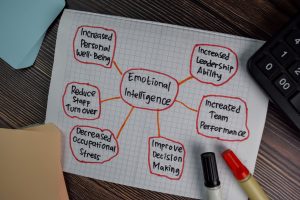Emotional intelligence (EI) has emerged as a pivotal component in the realm of leadership, transcending traditional notions of intelligence that primarily focus on cognitive abilities. At its core, emotional intelligence encompasses the capacity to recognise, understand, and manage one’s own emotions while also being attuned to the emotions of others. This dual awareness is particularly crucial for leaders, as it enables them to navigate the complexities of interpersonal relationships within their teams.
Leaders with high emotional intelligence are often more adept at fostering an environment of trust and collaboration, as they can empathise with their team members’ feelings and perspectives. This empathetic approach not only enhances communication but also cultivates a sense of belonging among team members, which is essential for maintaining morale and motivation. Moreover, the significance of emotional intelligence in leadership extends beyond mere interpersonal dynamics; it plays a critical role in decision-making processes.
Leaders who possess a strong sense of emotional awareness are better equipped to assess situations holistically, considering both the emotional and rational aspects of a decision. This balanced approach allows them to make more informed choices that resonate with their team’s values and aspirations. Furthermore, emotionally intelligent leaders are often more resilient in the face of challenges, as they can manage their own stress and emotions effectively.
This resilience not only sets a positive example for their teams but also fosters a culture of adaptability and perseverance, which is vital in today’s rapidly changing business landscape.
Summary
- Emotional intelligence is crucial for effective leadership, as it involves understanding and managing emotions in oneself and others.
- Developing emotional intelligence skills involves self-awareness, self-regulation, motivation, empathy, and social skills.
- Emotional intelligence has a significant impact on sustainable leadership, as it fosters trust, collaboration, and resilience in the face of challenges.
- Using emotional intelligence to build effective teams involves creating a positive and supportive work environment, fostering open communication, and resolving conflicts constructively.
- Nurturing emotional intelligence in organisational culture requires leaders to model and promote emotional intelligence, provide training and support, and align policies and practices with emotional intelligence principles.
- Overcoming challenges in applying emotional intelligence in leadership involves recognising and addressing biases, managing stress and pressure, and continuously developing and refining emotional intelligence skills.
Developing Emotional Intelligence Skills
Developing emotional intelligence skills is a multifaceted process that requires intentional practice and self-reflection. One of the foundational elements of enhancing EI is self-awareness, which involves recognising one’s own emotional triggers and understanding how these emotions influence behaviour. Leaders can cultivate self-awareness through various methods, such as mindfulness practices, journaling, or seeking feedback from peers and mentors.
By engaging in these reflective practices, leaders can gain insights into their emotional responses and identify patterns that may hinder their effectiveness. This heightened self-awareness not only empowers leaders to manage their emotions more effectively but also enhances their ability to connect with others on a deeper level. In addition to self-awareness, developing emotional intelligence necessitates honing skills such as empathy and active listening.
Empathy involves the ability to put oneself in another’s shoes and understand their feelings and perspectives. Leaders can enhance their empathetic abilities by actively engaging with team members, asking open-ended questions, and demonstrating genuine interest in their experiences. Active listening is equally crucial; it requires leaders to fully concentrate on what others are saying without formulating responses prematurely.
By practising these skills consistently, leaders can create an atmosphere where team members feel valued and understood, ultimately leading to stronger relationships and improved collaboration.
The Impact of Emotional Intelligence on Sustainable Leadership
The impact of emotional intelligence on sustainable leadership cannot be overstated, as it serves as a cornerstone for fostering long-term success within organisations. Sustainable leadership is characterised by a commitment to ethical practices, social responsibility, and environmental stewardship. Leaders who possess high emotional intelligence are more likely to prioritise these values, as they are attuned to the needs and concerns of various stakeholders, including employees, customers, and the broader community.
By integrating emotional intelligence into their leadership approach, these leaders can create a vision that resonates with their teams and inspires collective action towards sustainable goals. Furthermore, emotionally intelligent leaders are adept at navigating the complexities of change management, which is essential for sustainability in today’s dynamic business environment. They understand that change often elicits strong emotional responses from team members, ranging from fear to resistance.
By leveraging their emotional intelligence, these leaders can address these concerns empathetically, providing support and reassurance throughout the transition process. This ability to manage emotions during times of change not only mitigates potential disruptions but also fosters a culture of resilience and innovation. As a result, organisations led by emotionally intelligent leaders are better positioned to adapt to evolving market demands while maintaining a strong commitment to sustainability.
Using Emotional Intelligence to Build Effective Teams
Building effective teams is a critical aspect of successful leadership, and emotional intelligence plays a vital role in this endeavour. Teams that operate with high levels of emotional intelligence tend to exhibit greater cohesion, collaboration, and overall performance. Leaders who prioritise EI in team dynamics create an environment where individuals feel safe to express their thoughts and emotions openly.
This psychological safety encourages team members to share ideas freely, take risks, and engage in constructive conflict when necessary. As a result, teams become more innovative and agile, capable of responding effectively to challenges and opportunities alike. Moreover, emotionally intelligent leaders are skilled at recognising and leveraging the diverse strengths of their team members.
By understanding each individual’s unique emotional makeup and motivations, leaders can assign roles that align with their strengths and passions. This tailored approach not only enhances individual job satisfaction but also optimises team performance as members work collaboratively towards common goals. Additionally, emotionally intelligent leaders foster an inclusive culture where diversity is celebrated, allowing for a richer exchange of ideas and perspectives.
In this way, EI serves as a catalyst for building high-performing teams that are not only effective but also resilient in the face of adversity.
Nurturing Emotional Intelligence in Organisational Culture
Nurturing emotional intelligence within an organisational culture is essential for fostering an environment conducive to growth and innovation. Organisations that prioritise EI create a foundation where employees feel valued and supported in their personal and professional development. This cultural shift begins with leadership; when leaders model emotionally intelligent behaviours—such as empathy, active listening, and open communication—they set the tone for the entire organisation.
By embedding these values into the organisational ethos, leaders can cultivate a culture that prioritises emotional well-being alongside performance metrics. Furthermore, organisations can implement training programmes focused on developing emotional intelligence skills among employees at all levels. These programmes can include workshops on self-awareness, conflict resolution, and effective communication strategies.
By investing in the emotional intelligence development of their workforce, organisations not only enhance individual capabilities but also strengthen team dynamics and overall organisational performance. Additionally, fostering an emotionally intelligent culture encourages employees to take ownership of their emotional health, leading to increased job satisfaction and reduced turnover rates. Ultimately, nurturing EI within an organisation creates a virtuous cycle where employees thrive personally and professionally while contributing positively to the organisation’s success.
Overcoming Challenges in Applying Emotional Intelligence in Leadership
Despite the numerous benefits associated with emotional intelligence in leadership, there are challenges that leaders may encounter when attempting to apply these principles effectively. One significant challenge is the potential for emotional fatigue or burnout among leaders themselves. The demands of being attuned to others’ emotions while managing one’s own can be overwhelming, particularly in high-stress environments.
Leaders must therefore prioritise self-care and establish boundaries to ensure they remain emotionally available without compromising their well-being. This balance is crucial; if leaders become emotionally drained, their ability to lead with empathy and insight diminishes significantly. Another challenge lies in the varying levels of emotional intelligence among team members.
Not all individuals possess the same capacity for emotional awareness or regulation, which can lead to misunderstandings or conflicts within teams. Leaders must navigate these differences with sensitivity and patience while fostering an environment that encourages growth in emotional intelligence for all team members. This may involve providing additional support or resources for those who struggle with EI skills or facilitating open discussions about emotions within the team context.
By addressing these challenges head-on and promoting a culture of continuous learning around emotional intelligence, leaders can enhance their effectiveness while empowering their teams to thrive collectively.
In the pursuit of enhancing leadership capabilities through emotional intelligence, it is also crucial to consider the impact of our digital environment on our cognitive functions. An insightful article, 4 Tips to Enable Effective Brains for the Digital Age, offers valuable strategies for adapting our brain health to thrive in a technologically driven world. This piece complements the discussion on sustainable leadership by providing practical advice on maintaining cognitive efficiency and emotional resilience amidst the challenges posed by digital distractions and information overload.





